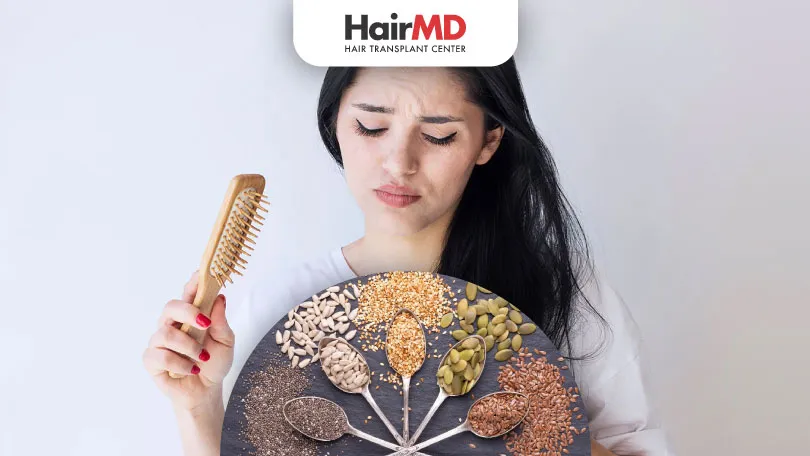27th July, 2022

Indian kitchen is a powerhouse of magical spices which aid in treating minor health issues. The Indian household frequently uses fenugreek seeds not just to add flavour to food and treat hair problems such as dandruff, itchy scalp, and hair thinning.
What’s covered in the article?
- Essential Nutrients In Fenugreek Seeds
- Side Effects of Fenugreek
- Conclusion
Essential Nutrients In Fenugreek Seeds
What essential nutrients are hidden in these tiny seeds? Let’s find out, can fenugreek seeds stop hair fall?
- Flavonoids and saponins present in the fenugreek plant compound are believed to treat moderate hair loss in males and females as it stimulates blood circulation in the scalp. It may also interact with DHT in the body to block its attachment with hair follicles. When DHT attaches to hair follicles, it leads to hair loss or hair thinning.
- Iron content in fenugreek helps boost blood circulation and carry oxygen and nutrients to hair roots, helping hair grow longer, faster and healthier.
- Fenugreek seeds are rich in proteins. Hair is made of protein, and therefore fenugreek can aid in strengthening the roots of the hair.
- Rich in folic acid, Vitamin A, Vitamin K and Vitamin C, fenugreek seeds are beneficial against dandruff and treat various scalp issues, including hair thinning.
- Lecithin in fenugreek hydrates and moisturises the hair and helps bring back the shine and lustre in the hair.
- Potassium in fenugreek can also control premature ageing.
Can fenugreek seeds stop hair fall? There is no scientific proof, but it is believed that fenugreek seeds may help you get rid of dandruff and flakes. Soak methi seeds in water and consume them to improve hair quality. It may induce hair growth and make your hair look thicker. The bitter taste of fenugreek makes it a little difficult to swallow. One can try a topical mask and oil solution by adding fenugreek to your hair mask or oil.
Side Effects of Fenugreek
Fenugreek can cause a few side effects:
- Nasal Congestion
- Coughing
- Wheezing
- Facial Swelling
- Severe Allergic Reactions In Hypersensitive People
So, before using fenugreek seeds, it’s better to consult a dermatologist or perform a patch test to avoid side effects.
As there is not much evidence on eating fenugreek seeds for hair loss, dermatologists believe that they alone cannot control or help in hair regrowth; consequently, it is better to seek medical consultation with HairMD before your condition worsens.
Our expert team of dermatologists can help you with any kind of hair issue. They will conduct various hair and scalp tests before designing your treatment procedure, ensuring the best results. Why Wait! Book your consultation today!
Do You Know?
Nearly 250 Patients Visit HairMD
Everyday For Various Hair Concerns?
(Your journey to healthier and fuller hair starts here!)
Meet Our Dermatologists
Conclusion
Fenugreek seeds offer potential benefits for hair health, as they contain essential nutrients like proteins, iron, and vitamins that may promote hair growth and reduce scalp issues. However, there is limited scientific evidence supporting their effectiveness in treating hair loss. Additionally, fenugreek may cause side effects such as allergic reactions, so it’s important to consult a dermatologist before use. Relying solely on fenugreek seeds is not recommended for hair loss treatment without professional guidance.
Further Reading
Rosemary Oil for Hair Growth: Benefits and Side Effects
Explore the benefits of rosemary oil for hair growth & learn about its potential side effects. Our guide covers how to use rosemary oil to promote healthy hair growth.
How Much Hair Loss is Normal for Teenage Male?
Understand normal hair loss in teenage males and when it may signal an issue. Visit HairMD Pune for expert advice on teenage hair health and treatment options.
Ultimate Food Guide For Healthy Hair
Struggling with hair fall? This Food For Healthy Hair guide shares easy diet tips to support stronger, healthier hair naturally.
How to remove scabs after Hair Transplant? | HairMD
The correct way to remove scabs after hair transplant without damaging grafts. Get expert-backed tips from HairMD Pune to support a smooth recovery.
Have thoughts? Please let us know
We are committed not only to treating you, but also educating you.











